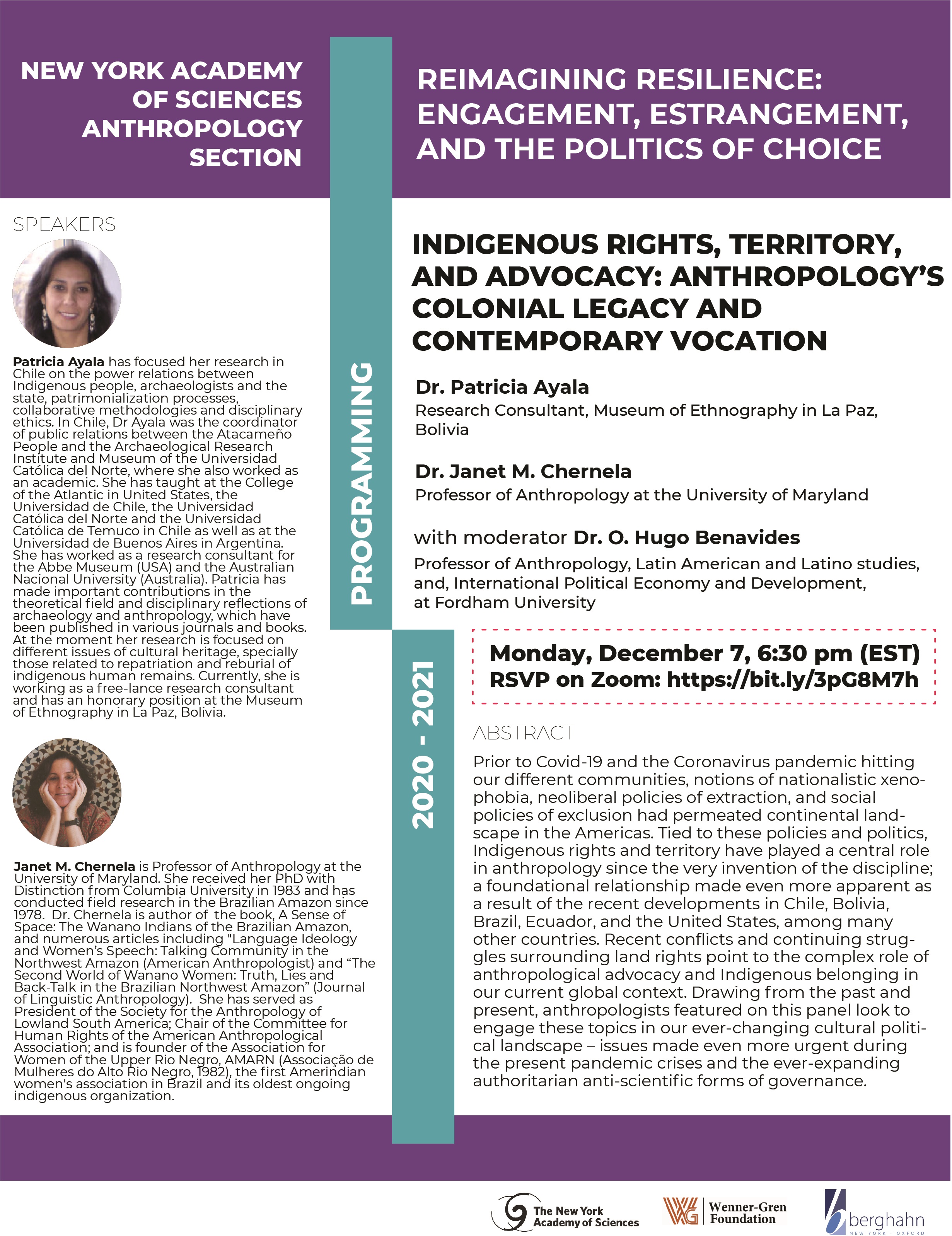Webinar 12/7: Indigenous Rights, Territory, and Advocacy: Anthropology’s Colonial Legacy and Contemporary Vocation
On December 7th, 6:30 PM EST the New York Academy of Sciences lecture series continues when Drs. Patricia Ayala, Research Consultant, Museum of Ethnography in La Paz, Bolivia, and Janet M. Chernela, Professor of Anthropology at the University of Maryland, will be presenting, “Indigenous Rights, Territory, and Advocacy: Anthropology’s Colonial Legacy and Contemporary Vocation”. Dr. O. Hugo Benavides, Professor of Anthropology, Latin American and Latino studies, and, International Political Economy and Development, at Fordham University, will be moderating. To register for this even click here.
Prior to Covid-19 and the Coronavirus pandemic hitting our different communities, notions of nationalistic xenophobia, neoliberal policies of extraction, and social policies of exclusion had permeated continental landscape in the Americas. Tied to these policies and politics, Indigenous rights and territory have played a central role in anthropology since the very invention of the discipline; a foundational relationship made even more apparent as a result of the recent developments in Chile, Bolivia, Brazil, Ecuador, and the United States, among many other countries. Recent conflicts and continuing struggles surrounding land rights point to the complex role of anthropological advocacy and Indigenous belonging in our current global context. Drawing from the past and present, anthropologists featured on this panel look to engage these topics in our ever-changing cultural political landscape – issues made even more urgent during the present pandemic crises and the ever-expanding authoritarian anti-scientific forms of governance.
SPEAKERS
Patricia Ayala has focused her research in Chile on the power relations between Indigenous people, archaeologists and the state, patrimonialization processes, collaborative methodologies and disciplinary ethics. In Chile, Dr Ayala was the coordinator of public relations between the Atacameño People and the Archaeological Research Institute and Museum of the Universidad Católica del Norte, where she also worked as an academic. She has taught at the College of the Atlantic in United States, the Universidad de Chile, the Universidad Católica del Norte and the Universidad Católica de Temuco in Chile as well as at the Universidad de Buenos Aires in Argentina. She has worked as a research consultant for the Abbe Museum (USA) and the Australian Nacional University (Australia). Patricia has made important contributions in the theoretical field and disciplinary reflections of archaeology and anthropology, which have been published in various journals and books. At the moment her research is focused on different issues of cultural heritage, specially those related to repatriation and reburial of indigenous human remains. Currently, she is working as a free-lance research consultant and has an honorary position at the Museum of Ethnography in La Paz, Bolivia.
Janet M. Chernela is Professor of Anthropology at the University of Maryland. She received her PhD with Distinction from Columbia University in 1983 and has conducted field research in the Brazilian Amazon since 1978. Dr. Chernela is author of the book, A Sense of Space: The Wanano Indians of the Brazilian Amazon, and numerous articles including “Language Ideology and Women’s Speech: Talking Community in the Northwest Amazon (American Anthropologist) and “The Second World of Wanano Women: Truth, Lies and Back-Talk in the Brazilian Northwest Amazon” (Journal of Linguistic Anthropology). She has served as President of the Society for the Anthropology of Lowland South America; Chair of the Committee for Human Rights of the American Anthropological Association; and is founder of the Association for Women of the Upper Rio Negro, AMARN (Associação de Mulheres do Alto Rio Negro, 1982), the first Amerindian women’s association in Brazil and its oldest ongoing indigenous organization.
O. Hugo Benavides is Professor of Anthropology, Latin American and Latino studies, and, International Political Economy and Development, at Fordham University, as well as, Chair of the Sociology and Anthropology Department. He also is the founding director of the Strategic Research Consortium on Global Studies and of the Liberal Arts Program at Fordham’s London Center at Kensington. His research has been supported by grants from the Woodrow Wilson National Foundation, National Science Foundation, Wenner Gren Foundation, Social Science Research Council and the Andrew R. Mellon Foundation. His initial interest in the past provided him an extensive archaeological practice excavating both Inca sites in the Andes and the Roman site of Pompeii in Italy. This initial interest in the politics of the past is present in his first book, Making Ecuadorian Histories: Four Centuries of Defining the Past, (University of Texas Press, 2004), which is a study of the role of history in legitimizing the transnational concerns of Latin American social movements, including the state. His second book, The Politics of Sentiment: Remembering and Imagining Guayaquil, is a case-study of Raymond William’s hypothesis of structures of feeling as a tool of internal domination (UT Press, 2006). His third book, Drugs, Thugs and Divas: Latin American Telenovelas and Narco-Dramas, (UT Press, 2008) investigates the cultural dynamics of melodrama as it is used to re-signify the changing legacy of Latin American identity in a transnational context. He has written over 50 articles that have appeared in edited volumes and scholarly journals such as Latin American Antiquity, Critique of Anthropology, ICONOS, and Social Text, among many others. He lives in Brooklyn with his partner of 26 years and their three cats.
